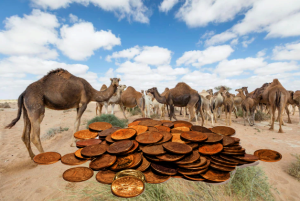ANOTHER THEME THAT ECHOES through the conversation between Job and his friends—sometimes loudly, sometimes quietly—involves his wealth. Unfortunately for his friends, their words reveal more of their attitude toward money than it does about Job’s.

If you recall, the book states right from the start that Job was among the richest men of his time and place—the Bill Gates or Warren Buffett of the Mideast. The “capital” of that day was livestock, and “[h]e owned seven thousand sheep, three thousand camels, five hundred yoke of oxen and five hundred donkeys, and had a large number of servants. He was the greatest man among all the people of the East.” (v. 1:3)
The issue for his friends, however, was their suspicion of how he attained those riches. This odd suspicion makes us wonder how well they even knew Job, but we will speak of that in our chapter on the qualities of true friendship.
Their underlying, albeit ignorant, assumption was that he attained those riches by taking advantage of those around him, especially those that were dependent on him for their livelihood. We don’t know whether this attitude may have come from their experience with other rich men, or whether it sprang solely from some underlying suspicion . . . or basic jealousy.
Eliphaz, the most accusatory of his friends, says straight to Job’s face: “You gave no water to the weary and you withheld food from the hungry, though you were a powerful man, owning land—an honored man, living on it. And you sent widows away empty-handed and broke the strength of the fatherless.” (v. 22:7–9)
With the presumption that his riches were the fruits of this evil behavior, he goes on to advise Job that his only means of redemption would be to throw it all away, and challenges him to “assign [his] nuggets to the dust, [his] gold of Ophir to the rocks in the ravines, then the Almighty will be [his] gold, the choicest silver for [him]” (v. 22:24-25)
Camels, Camels, Everywhere!
Eliphaz again shows his jaundiced view of riches and the rich by assuming that a man simply cannot be both rich and righteous. This concept resurfaces at the other end of the Bible, when we find it mentioned by Jesus Christ in the gospels of Matthew and Mark, saying that it’s easier for a camel to go through the eye of a needle than for a rich man to go to heaven. But it is rarely noted that, in that section, the next sentence counters that “with men this is impossible, but with God all things are possible.” (Matt 19:24–26, Mk 10:25–27)
But returning to the words of Job we see that, on the contrary, he had a perfectly biblical view of wealth. He knew that it could be here one day and gone the next: “[A man] lies down wealthy, but will do so no more; when he opens his eyes, all is gone.” (v. 27:19). He would have been a perfect counter-example for Jesus’ parable of the rich young ruler who built bigger and bigger barns for his increasing wealth (Lk 12:18)
Elsewhere, Job continues the list of sins that he has not committed, saying, “If I have put my trust in gold or said to pure gold, ‘You are my security,’ if I have rejoiced over my great wealth, the fortune my hands had gained, . . . then these also would be sins to be judged, for I would have been unfaithful to God on high” (v. 31:24–25, 28)
Obviously, no one can fully know the heart of another. Certainly, it is a sign of a total lack of any intimate, respectful friendship when Elihu assumes the worst regarding Job’s attitude toward riches: “Be careful that no one entices you by riches; do not let a large bribe turn you aside. Would your wealth or even all your mighty efforts sustain you so you would not be in distress?” (v. 36:18–19)
Many throughout history and in our day have similar problems with wealth, whether their own or that of others. The point the book of Job seems to make—by example if not explicitly—is that Job was a rich man but not a sinful man, not a greedy man. His use of wealth included generosity towards the needy and the care and support of his family.